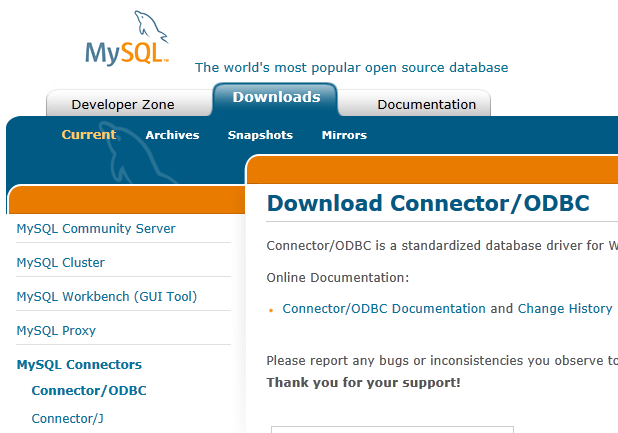SNMP to MySQL: Write SNMP values to the MySQL database
The configuration for data exporting to the MySQL database is similar to one described in the "Write data to the MSSQL database." Only the main differences are described in this manual.
1. Download and install the 32-bit version of MySQL ODBC Connector (the ODBC driver) for MySQL from mysql.org.

Fig. 1 SNMP. Driver section
2. The structure of a table in the database will look like this:
2.1 In the case of "Write a lot of SNMP items."
CREATE TABLE snmp_data (
REC_ID int(11) NOT NULL AUTO_INCREMENT,
TIMESTAMP datetime DEFAULT NULL,
ITEM_NAME varchar(25) NOT NULL,
ITEM_VALUE varchar(255) DEFAULT NULL,
PRIMARY KEY (REC_ID)
) ENGINE=InnoDB DEFAULT CHARSET=latin1;2.2 In the case of "Write several SNMP items."
CREATE TABLE snmp_data_2 (
REC_ID int(11) NOT NULL AUTO_INCREMENT,
TIMESTAMP datetime NOT NULL,
ITEM1 varchar(30) DEFAULT NULL,
ITEM2 varchar(30) DEFAULT NULL,
PRIMARY KEY (REC_ID)
) ENGINE=InnoDB DEFAULT CHARSET=latin1;If you specify any other data type than String for ITEM1 or ITEM2 in the SNMP settings, you should create the columns of the corresponding types while creating a table.
3. Create an ODBC data source for your MySQL database.
4. During "Binding," you should take into account that the names of the table and its columns are case-sensitive in MySQL.
Related articles: SNMP to MySQL: Write SNMP values to the MySQL database
- SNMP to MSSQL: Write a lot of SNMP values to the MS SQL Server database
- SNMP to MSSQL: Write several SNMP values to separate columns
- SNMP to MySQL: Export SNMP values to the MySQL 5 database
- SNMP to a database: Write SNMP values to a database
- SNMP to Excel: Save SNMP data to Excel
- Printer status monitoring via SNMP to Excel
Related topics: SNMP Data Logger
hereSNMP Data Logger RS232 pinout and signals Cables and signals Data monitor cables